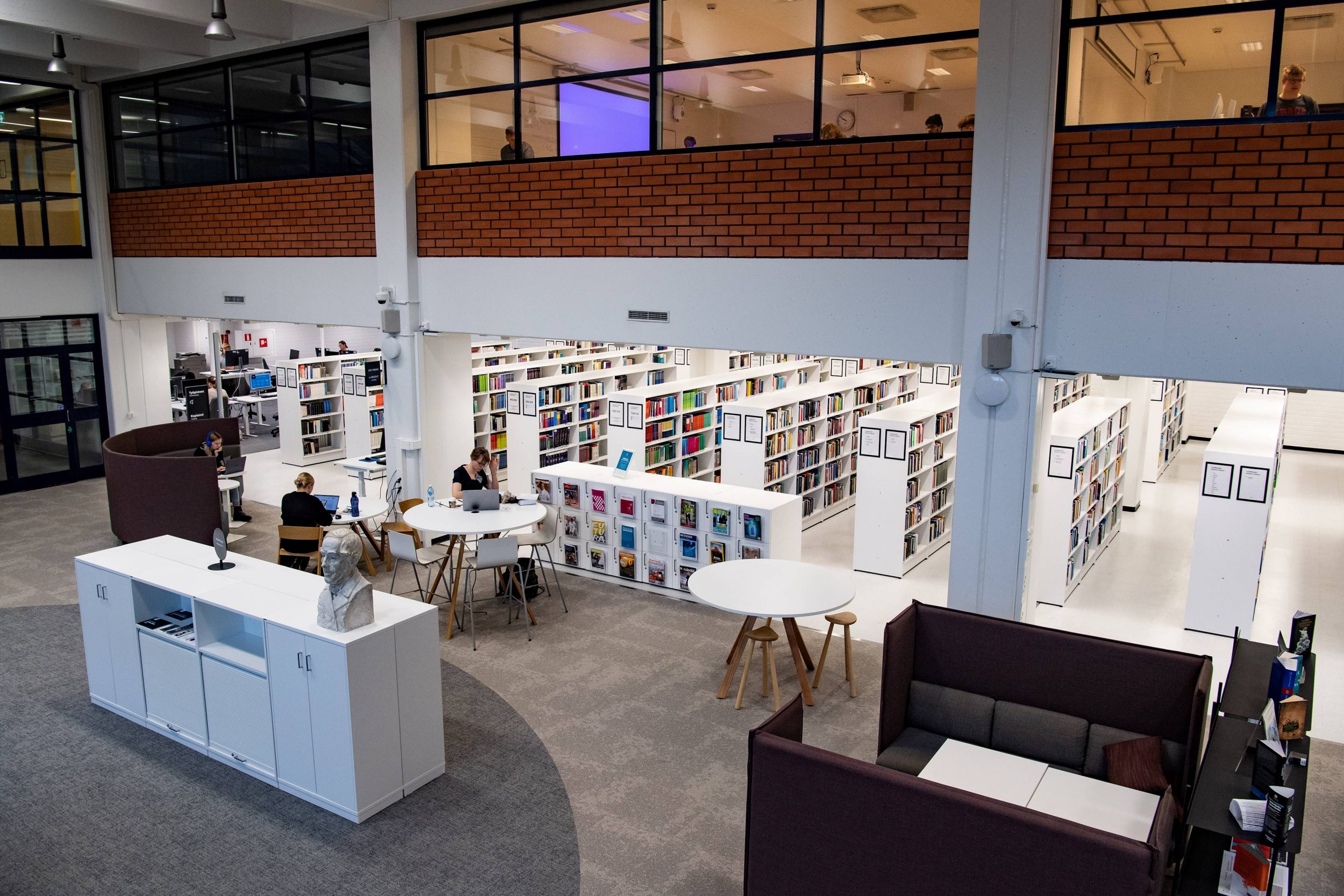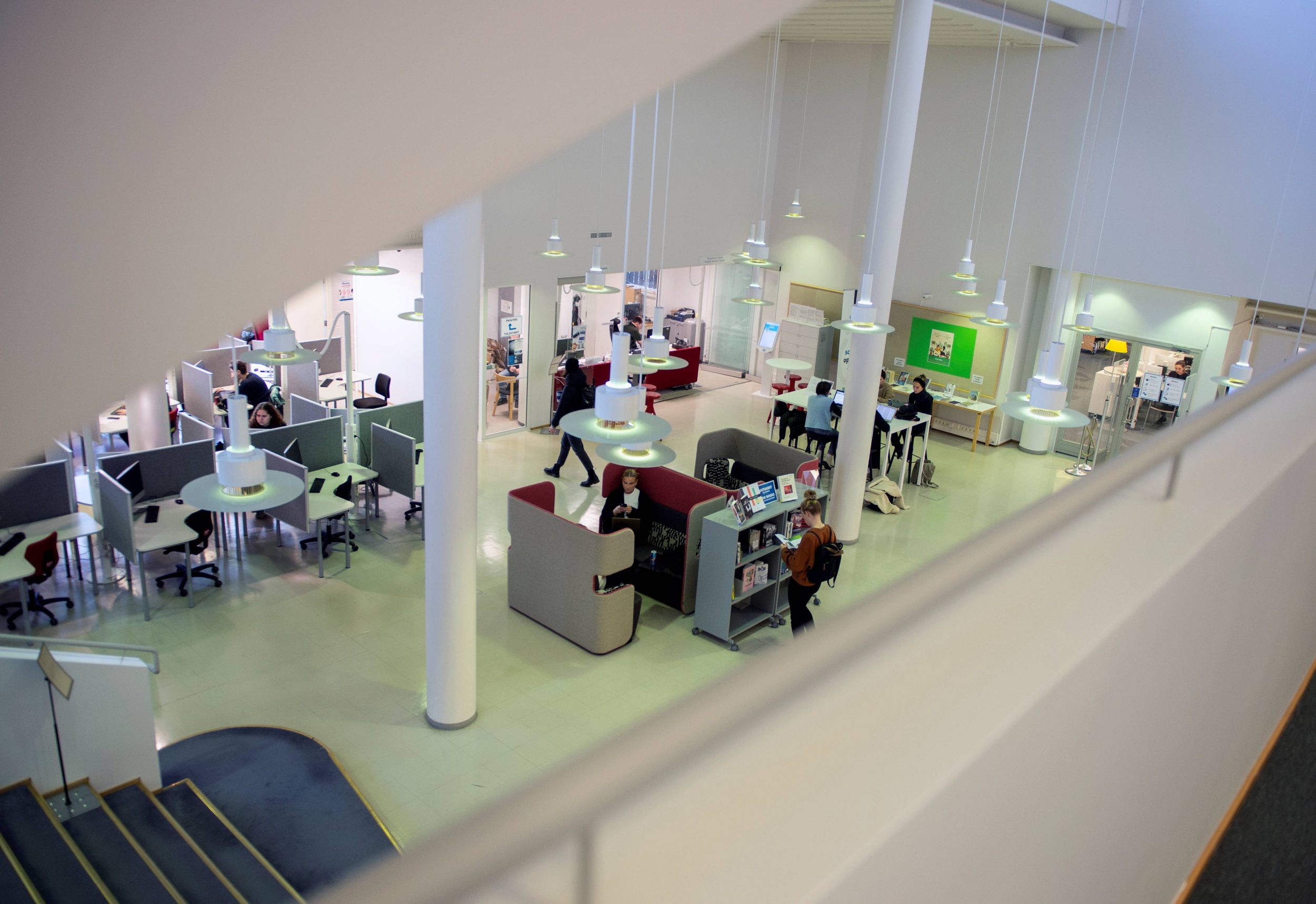Arki rullaa – Itä-Suomen yliopiston kirjaston vuosikertomus 2023 | Deep in Normal Mode – The University of Eastern Finland Library’s Annual Report 2023
(Please, scroll down to read in English.)
Tunne asiakkaasi
Kirjasto elää asiakkailleen. Meidän on tunnettava heidän tiedontarpeensa sekä osattava oikealla tavalla opastaa heitä tiedonhakuun ja tiedon käyttöön. Keräämme palautetta asiakkailtamme monin eri tavoin, jotta voimme kehittää omaa toimintaamme.
Kirjaston palautelomake nettisivuillamme on meille tärkeä tiedonlähde. Loppuvuonna 2022 toteutettu kampanja lisäsi mukavasti palautelomakkeen käyttöä. Iso osa kommenteista koski Joensuun kampuskirjaston työrauhaongelmia. Ratkaisuksi olemme kehittäneet äänivyöhykkeet, jotka kertovat, missä on sallittua rupatella enemmänkin ja missä pitää antaa työrauha lukijoille.
Kampanjan avulla saatu palaute vaikutti kirjaston toimintaan. Luemme palautteet tarkkaan ja pohdimme jokaisen viestin sanomaa. Lisääkin palautetta meille saa antaa. Otamme kiitollisina vastaan niin isot kuin pienetkin viestit, risut ja ruusut.
Kyselyjä käytämme, kun kaipaamme tietoa tiettyihin täsmäkysymyksiin. Viime vuonna kohdistimme kyselyn avoimen yliopiston opiskelijoille. He ovat kasvava asiakasryhmä, jolle emme aina voi tarjota kaikkea heidän kaipaamaansa palvelua esimerkiksi aineistojen lisenssisopimusten rajoitusten vuoksi. Siksi on tärkeää tietää, miten voimme kehittää toimintaamme heidän kannaltaan.
Näiden tiedonhankintatapojen lisäksi käymme säännöllisesti keskusteluja ylioppilaskunnan kanssa. Kirjastolaiset osallistuvat yliopiston toimielimiin ja työryhmiin, joista nappaamme ajatuksia ja ideoita toimintaamme.
Kaikki nämä toimet ovat meille arvokkaita ja antavat tietoa toimintamme kehittämiseksi.

Omatoimisuus
Asiakkaamme ovat tottuneet omatoimisuuteen, onhan suuri osa kirjaston aineisto- ja palvelutarjonnasta käytettävissä verkossa vuorokauden ympäri. Kampuskirjastojen tilat toimivat opiskelu- ja ryhmätyötiloina, kävijöillä on yhä harvemmin asiaa palvelutiskimme päivystäjälle. Tarjoammekin entistä enemmän tukea nettisivuillamme oppain, ohjein, kurssein ja videoin.
Kirjastomme hakupalvelu UEF-Primo tarjoaa apua tiedonhankintaan, on kyse sitten tietystä teoksesta tai lehdestä taikka yleisemmin tiettyä aihealuetta koskevasta tiedonhausta. UEF-Primo on erittäin suosittu, siihen avataan istunto keskimäärin 7 000 kertaa joka vuorokausi ympäri vuoden. Järjestelmää kehitetään jatkuvasti, vaikka sen ominaisuudet ovat jo nyt varsin edistykselliset. Kehittäjäyhteisö on laaja, onhan järjestelmä käytössä lukuisissa kirjastoissa ympäri maailman.
Kirjaston omaa tuotantoa ovat monet kirjaston käytön ja tiedonhaun oppaamme. Tiedonhakijan opas toimii hyvänä lähtökohtana tieteellisen tiedon haun opiskeluun. Yksi oppaan tarjoama oppi on se, että on opittava kysymään oikeita kysymyksiä. Olemme myös laajentaneet kirjastobotti Uffen vastausvalikoimaa tiedonhaun pariin opastavilla ohjeilla.
Kehittyneimmät tiedonhaun tekniikat omaksuu osallistumalla opetukseemme. Tarjosimme viime vuonna 38 opintopisteytettyä opintojaksoa, joista suorituksia tuli yli 2 000 opintopisteen verran. Saamamme opetuspalaute oli varsin positiivista. Erityistä kiitosta saimme opintomateriaaleistamme sekä käytännön harjoituksista.
Vaikka kirjaston käyttö on muuttunut valtaosin omatoimiseksi, emme jätä asiakkaitamme yksin. Tukea on tarjolla.
Työ yliopiston hyväksi
Rehtori hyväksyi joulukuussa 2023 yliopiston avoimen tieteen ja tutkimuksen linjauksen. Dokumenttia luonnosteltiin kirjastossa ja yliopiston avoimen tieteen työryhmässä huolella. Tutkimuksen johtoryhmä antoi sille viimeisen silauksen marraskuussa ennen sen päätymistä rehtorin työpöydälle.
Linjaus kuvaa aluksi avoimen tieteen viimeaikaista edistymistä. Se asettaa tavoitteet yliopistolle neljällä osa-alueella: avoin oppiminen, avoin data, tutkimusinfrastruktuurit sekä avoin julkaiseminen. Linjauksen aikajänne on pitkä, useita vuosia. Siksi osa tavoitteista on hyvinkin kunnianhimoisia.
Kirjaston vetämänä laadittiin myös erillinen avoimen oppimisen tiekartta. Se on linjausta konkreettisempi dokumentti, jossa määritellään toimenpiteitä oppimisen avoimuuden edistämiseksi. Tiekartan toteuttamiseksi akateeminen rehtori antoi kirjaston tehtäväksi ryhtyä rakentamaan yliopiston omaa verkostoa, joka yhdistää avoimesta oppimisesta kiinnostuneet yliopistolaiset.
Tekoäly
Kirjaston omien testien mukaan tekoälyllä on vielä matkaa hyväksi tiedonhaun apuriksi. Kysyjä saa kyllä tekoälyltä vastauksia, mutta niihin pitää ainakin toistaiseksi suhtautua varsin kriittisesti. Tekoäly on jo varsin hyvä suurten asioiden tiivistäjä, mutta tarkkoja ja täsmällisiä vastauksia yksityiskohtaisiin kysymyksiin se ei välttämättä osaa antaa.
Tekoäly on saanut runsaasti huomiota viimeisen vuoden aikana. Sen vaikutusta on verrattu internetin aikaansaamaan teknologiseen harppaukseen.
Tekoäly vastaa aina, kun siltä kysytään. Vastaus perustuu aina niihin tekstimassoihin, joilla se on koulutettu. Ongelmiin törmätään, jos etsitään tietoa lähdeartikkeleiden tarkkuudella. Olemme törmänneet tilanteisiin, joissa vastaukset ovat keksittyjä ja esimerkiksi viittaavat artikkeleihin, joita ei oikeasti ole olemassa.
Tässä voi kokeneempikin mennä vipuun. Kaukopalveluumme on jo tullut kysely artikkelista, joka paljastui tekoälyn tekemäksi ja siis olemattomaksi.
Kirjaston kehittämispäivässä saimme kuulla positiivisen kokemuksen, kun yliopistomme professori Pasi Vahimaa kertoi meille, miten hän käyttää tekoälyä apuna opetuksessaan. Näkemämme kuvat ja kuulemamme uudet opetusmetodit olivat upeita ja vakuuttavia. Opimme, että tekoäly on vain yksi työkalu monien muiden joukossa, ei sen parempi tai huonompi kuin muutkaan. Sitä vain pitää opetella käyttämään oikealla tavalla.

Know your customers
A library lives for its customers. We must know their needs for information and provide appropriate guidance for their information retrieval and the use of said information. We collect feedback from our customers through numerous channels in order to further develop our activities.
The library’s feedback form on our website is an important source of information to us. Our feedback campaign towards the end of 2022 increased the use of our feedback form nicely. Many of the comments pertained to the lack of working peace on the Joensuu campus. As a solution, we have developed sound zones that inform the customers where talking is fine and where readers should be allowed peace and quiet.
The feedback from the campaign affected the library’s operations. We read all feedback carefully and contemplate on the meaning of each message. The more feedback the better, and we gratefully accept all messages be they long or short, positive or negative.
We use surveys when we require information on specific matters. Last year we conducted a survey for Open University students. They are a growing group of customers for whom we can’t always provide the services they need due to, for example, limitations set by licensing agreements. Therefore, it is important to know how we can better develop our services for them.
In addition to these information acquisition methods, we also engage in regular discussions with the Student Union. We librarians participate in university institutions and working groups, from where we get ideas and inspiration for our activities.
All these activities are valuable to us and provide information for the development of our operations.
Self-sufficiency
Our customers are used to self-sufficiency in their activities. This makes perfect sense seeing how much of the library’s collection and services are available for use around the clock. The facilities of the campus libraries function as studying and group work facilities, and the visitors need assistance from the service desk less and less frequently. As a matter of fact, we continued to provide more support on our website through guides, instructions, courses, and videos.
The library’s search service, UEF Primo, provides help in information retrieval whether you’re looking for a specific book, journal, or conducting a more general search on a specific topic. UEF Primo is extremely popular, and there are approximately 7,000 daily sessions on the service around the year. Although its functionalities are already quite advanced, the system is still constantly developed. The developer community is large as many libraries around the world use the same system.
The material produced by the library itself includes our many guides on the use of our facilities and information retrieval. The Guide to Information Retrieval serves as an excellent starting point to studying scientific information retrieval. One lesson provided by the guide is that you must learn to ask the right questions. In addition, we have expanded the library’s chatbot Uffe’s answer pool with instructions that lead you towards seeking your own answers.
The most advanced information retrieval techniques are taught in our classes. Last year, we offered 38 credit point courses, which resulted in over 2 000 credits for the students. The feedback was quite positive. We received particular praise for our teaching materials and practical exercises.
Although library use has become increasingly self-sufficient, we will not leaver our customers to fare on their own. Support is always available.
Work for the benefit of the university
In December 2023, the rector accepted the university’s open science and research policy. The document was carefully drafted by the library and the university’s working group on open science. In November, the Steering Committee for Research gave the policy its final touch before it made its way onto the rector’s desk.
The policy first describes the recent advances in open science. It sets objectives for the university in four areas: open learning, open data, research infrastructures, and open publishing. The time period covered by the policy is long, spanning multiple years. This explains why some of the objectives are notably ambitious.
The library was also in charge of developing a separate roadmap for open learning. As a document it is more concrete than the policy, setting out measures to promote open learning. To implement the roadmap, the Academic Rector tasked the library with setting up a network for the university that would bring together staff interested in open learning.
Artificial Intelligence
According to the library’s testing, artificial intelligence is still far from a competent information retrieval assistant. While AI does provide many answers, they should for the time being be assessed quite critically. AI is already good at summarising extensive matters, but it may not be able to provide specific and exact answers for detailed queries.
Artificial intelligence has been subject to much attention over the past year. The effect it’s had has been compared to the technological leap that came with the internet.
AI always answers every question you ask. The answer is always based on the text masses it has been trained with. Problems are encountered when searching for information with the precision of source articles. We have encountered situations where the answers are made up and, for example, refer to articles that do not really exist.
Even experienced users may be fooled by this, and our remote service has already received requests concerning articles that turned out to be fabricated by the AI.
At the library’s development day, we had a positive experience when Professor Pasi Vahimaa from our university elaborated on how he uses AI as help in his teaching. The images we saw and the new teaching methods we heard about were stunning and convincing. We learned that AI is just one tool among many others, not necessarily better or worse than the rest. One simply has to learn the proper ways of using it.
Ari Muhonen
Kirjaston johtaja|Library Director
Tilastot 2023 | Statistics 2023
Katso myös Kirjoittajamaksut Itä-Suomen yliopistossa 2022 | See also Article processing charges in the University of Eastern Finland 2022
Henkilökunta 2023 | Library staff 2023
Kirjaston henkilökunnan julkaisut 2023 | Library staff’s publications 2023
Kirjaston henkilökunnan luennot, esitelmät, konferenssiosallistumiset ja asiantuntijatehtävät 2023 | Library staff’s lectures, presentations, conference participation and expert activities in 2023